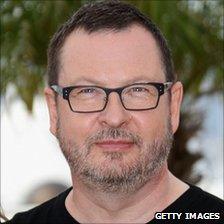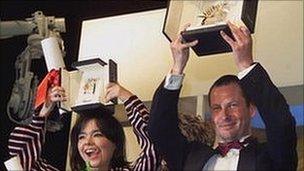Lars Von Trier's controversial career
- Published

Von Trier once declared he was "the best film director in the world"
The Danish film-maker Lars Von Trier has never shied away from controversial material, or from making contentious pronouncements.
Yet even he must regret the rash comments that have seen him declared a "persona non grata" by the organisers of the Cannes Film Festival in France.
It was apparently clear to those present at Wednesday's press conference that he was joking when he declared himself a Nazi who felt sympathy for Adolf Hitler.
It was also clear, though, that his misguided attempts at humour had taken him into areas where there is little humour to be found.
Born in 1956 in Copenhagen, Lars Trier began making movies as a child with a Super 8 camera.
He went on to study at the Danish Film School, where he was encouraged by his fellow students to adopt the "Von".
Award-winning student films were followed by his first feature, The Element of Crime, in 1984.
A nightmarish, visually distinctive thriller, it became the first of several Von Trier works to be shortlisted for Cannes' prestigious Palme d'Or award.
The director was back in Cannes in 1991 with Europa, a drama set in Germany in the aftermath of World War II, which ended up sharing the Jury prize.
Von Trier was put out not to win the Palme, though, referring to Roman Polanski - chair of that year's jury - as "the midget".

Both Von Trier and Bjork (left) were honoured at the 2000 Cannes Film Festival
The Dane's international standing was boosted by The Kingdom, an atmospheric mini-series set in a creepy Copenhagen hospital.
He also received acclaim for Breaking the Waves, an unsettling film about a naive young woman - played by Britain's Emily Watson - whose devotion to her husband has shocking consequences.
To most cineastes, though, he is best known as a co-signatory of the Dogme 95 manifesto - a "vow of chastity" he made with three fellow Danish film-makers.
Their films, they declared, would strip away artifice by being shot on location using natural light and handheld cameras.
Under these self-imposed restrictions, Von Trier made The Idiots - a hugely divisive film about young people who pretend to be mentally and physically impaired.
The BBC's Mark Kermode was so incensed by the result he was ejected from its screening in Cannes after loudly voicing his objections.
Deathbed confession
In 2000 Von Trier finally won the Palme d'Or with Dancer in the Dark, a musical starring Icelandic pop star Bjork as a woman who ends up on Death Row.
The film was attacked by some for being anti-American - charges that also dogged his next projects, Dogville and Manderlay.

Kristen Dunst (left) stars in his new film, end of the world fable Melancholia
The former, the first part of a proposed "US trilogy", saw a starry cast - led by Nicole Kidman - enact a period parable on a vast, largely empty soundstage.
The latter was embroiled in controversy from the off after the actor John C Reilly walked off the set in protest at the director's plans to have a donkey killed.
By now, Von Trier was firmly established as an "enfant terrible" who enjoyed an often combative relationship with members of the press.
That reputation was only enhanced by his 2009 film Antichrist, which whipped up a furore at Cannes with its explicit sex scenes and graphic violence.
The director stared down his critics, declaring he had made the movie for himself and that he was "the best film director in the world".
"I don't think I owe anyone an explanation," he said of the movie. "I made it for myself."
Von Trier has spoken openly about his unconventional upbringing, which saw him raised by Jewish parents who were both committed communists and enthusiastic nudists.
He has also battled depression - a possible consequence of being told by his mother, on her deathbed, that his biological father was, in fact, her German employer.
Throughout his career, the organisers of the Cannes Film Festival have remained staunch supporters.
It remains to be seen, however, whether he will ever be welcomed back to an event that may finally have tired of his idiosyncracies.
- Published19 May 2011